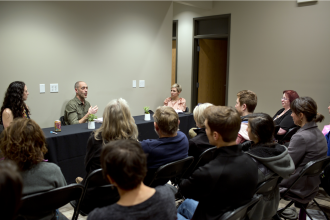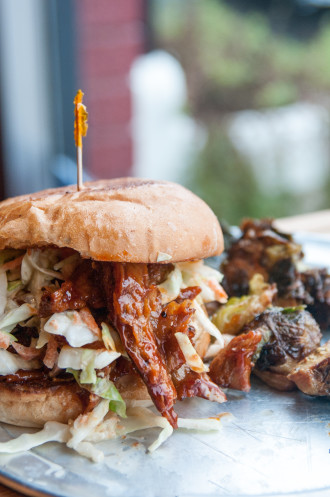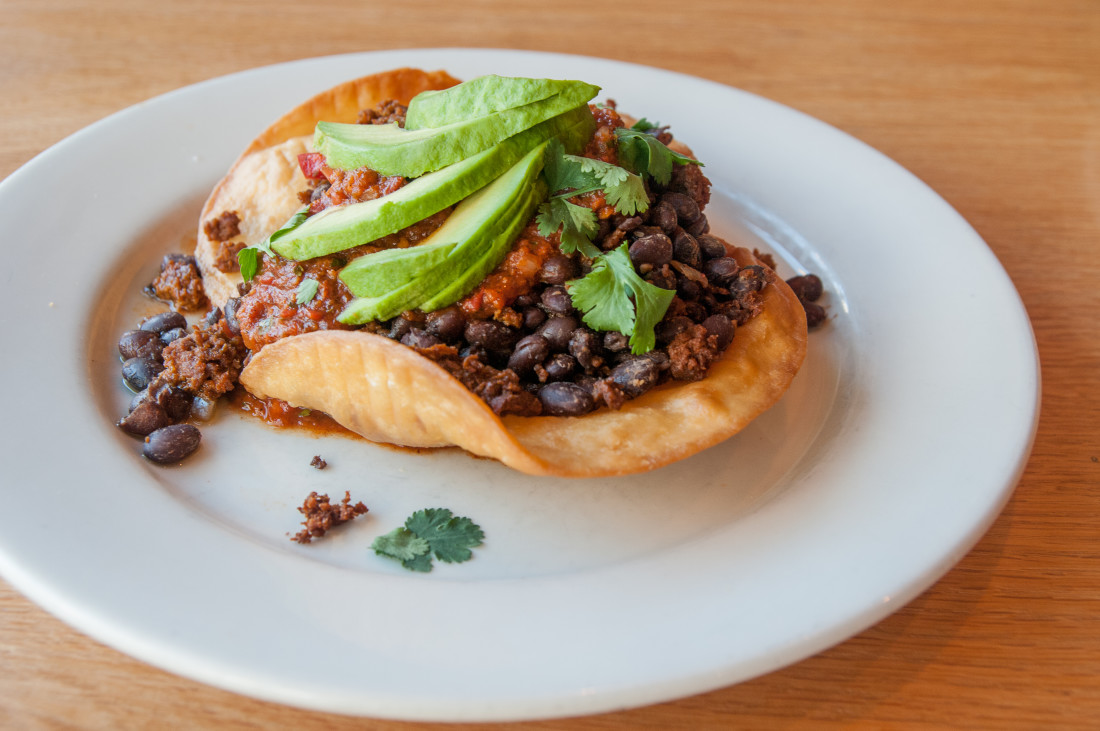As plant-based diets grow in popularity, vegans still field misconceptions on such topics as protein intake, athletic capacity and eating disorders. But what do local nutritionists say about a lifestyle that avoids animal products?
In late January, Asheville internist Dr. Carly Brown hosted a public panel alongside Stepfanie Romine, Hendersonville health coach and co-author of The No Meat Athlete Cookbook, and Jason Sellers, chef and co-owner of Asheville vegan restaurant Plant. The discussion at Brown’s Ashewell Clinic in the River Arts District took up the question of “How to Heal from Within.”
The panelists’ answer? Whole-foods, plant-based diets that feature fruits, vegetables, tubers, whole grains and legumes and exclude or minimize meat, chicken, fish, dairy and eggs, oils, fats and sugars. Largely — and for each of the three panelists — that recommended diet translates to veganism: abstaining from all products derived from animals, including eggs and dairy.
Brown emphasized the transformative impact of these dietary changes, which she said affect the root causes of illness, unlike pharmaceutical “attempts to slap a Band-Aid on things that started years and years ago.”

Brown drew on recent research suggesting that sharply reducing intake of animal products lowers the risk of cardiovascular illness, diabetes and cancer. “Think about all the money that we spend on medical care and on drugs,” she said. “If we spent that money on food, we’d be in a lot healthier place.”
With heart disease the most common cause of death in the United States — and diabetes and stroke also among the 10 most common — proponents believe plant-based diets could be central to balancing American eating habits.
Paul Berry, executive director of Asheville-based Brother Wolf Animal Rescue, attests to the health benefits of his vegan diet. Twenty-five years ago, he says, “I was working in the corporate world and had some health-related issues and went to a heart specialist. He put me on a heart-healthy diet. My girlfriend back then, now my wife, said, ‘That’s a vegetarian diet.’ I said, ‘Nah, that’s political, man; this is about heart health.’”
Berry says the dietary change reversed all his symptoms in a matter of weeks. “Within the symptoms they were tracking — my cholesterol, fat level in my blood, heart rate and blood pressure — it reversed all of those warning signs,” he says.
Brother Wolf Animal Rescue now hosts Asheville’s annual VeganFest event, which welcomes between 10,000-15,000 festivalgoers a year in a city that is consistently rated among the top vegan destinations in the country.
Eats and caveats
The panel made sure to emphasize that a healthy vegan diet is not as simple as eating some plants and voilá. Animal products offer a supply of certain nutrients that vegans should pay careful attention to maintain. Vitamin B12 is found only in animal-based products (with small amounts in certain algae and mushroom species); Brown recommends taking supplements to avoid B12 deficiency, which can lead to neurological issues, anemia and jaundice. Nutritional yeast can also help to make up the shortfall, but only because it is fortified with B12.
Vegans should likewise pay special attention to their calcium and omega-3 fatty acid intakes, both of which are most readily available and easiest to absorb in animal products. Calcium is available in dark leafy greens and firm tofu, and usually fortifies nondairy milks. Omega-3s can obtained through dietary supplements, walnuts and flax seeds. Zinc, iron and vitamin D are also commonly cited as dietary needs worthy of consideration for those eschewing animal products.
But the most common question vegans get, says Sadrah Schadel, is, “Where do you get your protein?” Schadel is a co-founder of Asheville-based No Evil Foods, which makes a line of vegan protein products, but she is quick to point out that meat substitutes are far from the only way to go. “The truth is that protein is everywhere,” she says. “For example, a potato, the average potato the size of your hand — that’s got 4 grams of protein in it.”
Schadel says the essential amino acids, or protein building blocks, that the human body needs are not specific to the animal kingdom. “When you think about where the protein comes from, the protein that’s found in meat and dairy products is only there because the animals have eaten plants,” she says. “So why don’t we just get our proteins from plants, too?”
Romine cited another macronutrient often neglected in typical diets but abundant in a vegan diet: fiber. “It keeps you regular, it keeps you fuller, and almost every American has a fiber deficiency,” she said. Statistics from the National Institutes of Health suggest that 95 percent of Americans fail to meet their daily need, but fruits and vegetables are fiber-rich, making them well suited to solve that shortfall.
Still, as with any dietary choices, eating vegan doesn’t necessarily mean eating healthy. Sarah Haske, a general dietitian in Asheville specializing in women’s health, said by email that the overarching concerns are consuming a diet too high in refined fats and oils, added sugars, highly processed foods and fast foods — all of which could potentially fit into a vegan diet. “It is important to think about context. Just because you follow the ‘rules’ of a particular diet does not mean it is necessarily healthy for you,” she says.
While veganism is not a shortcut to health, it can point practitioners in the right direction, Haske believes. “It is true though that a plant-predominant diet will offer great health benefits,” she says. “Consuming a diet high in plant foods offers high fiber, vitamins, minerals and phytochemicals [compounds found in plants], which all can contribute to reducing rates of cancer, obesity and diabetes.”
Vegan eating works best as part of broader healthy changes, according to Romine. “A whole-foods, plant-based diet is a whole-foods, plant-based lifestyle — diets do not work,” she said.
The China Study
Why do misconceptions seem to persist around plant-based eating? “I think there’s a lot of misinformation for anything nutrition-related, not just veganism,” says Denise Barratt, a dietitian in Asheville who does not work exclusively with plant-based diets. “There’s a lot of people out there that don’t have a degree going around telling people what to eat.”

Supporters of a whole-foods, plant-based diet point to a landmark study of eating habits in China and Taiwan — written up in the 2005 book, The China Study — as offering proof of the benefits of the diet. The 20-year study, funded by the University of Oxford, Cornell University and the Chinese government, compared diet and health outcomes across populations in rural China and found that cancer and cardiac disease rates among those eating a plant-rich diet were significantly lower than those among carnivores. But other doctors and health writers have quibbled with the study’s methods and conclusions, accusing the authors of sloppy data interpretation and cherry-picked findings.
The China Study’s thrust has roughly been repeated elsewhere. Research published in the Journal of the American College of Cardiology, for instance, shows that vegetarians who avoid refined grains and sweets are significantly less likely to develop heart disease than those who partake and than non-vegetarians. The American Institute for Cancer Research found that “limiting the amount of red meat and avoiding processed meat reduces the risk of certain types of cancer,” and recommends meals made up of at least two-thirds vegetables, fruits, whole grains and beans.
Ann Green, president of the Asheville Vegan Society, moved to the city in 2004 after finding that it was already much more vegan-friendly than her old home of central Florida. Since then, she has seen the diet’s popularity climb, and her group’s membership swell accordingly. “I think that the evidence showing how much healthier it is than a standard American diet is becoming more and more mainstream,” she explains. “It’s moving away from ‘it’s just this weird thing that some hippies do’ to something that makes sense for a lot of different reasons.”
While The China Study recommends cutting out meat entirely from the diet, other dietitians take a less absolute approach. “I encourage people being flexitarian, but eating mostly plant-based,” says Barratt. “If we try to eat from the colors of the rainbow as many days of the week as we can, then we’re getting a variety of these phytochemicals, vitamins and minerals in the fruits and vegetables.”
Image management
Others take a harder stance against veganism. In 2016’s Vegan Betrayal, Mara Kahn writes of her journey to veganism and back, saying her energy and health gradually faded while keeping vegan. In 2015’s Breaking Vegan, ex-vegan blogger Jordan Younger details how she returned from the brink of malnourishment and “orthorexia,” or obsession with eating only healthy foods, by reincorporating animal products in her diet. Only by leaving the vegan fold, claim these authors, were they able to find a sustainable relationship with food and with their own bodies.
Haske acknowledges that veganism might not be right for everyone. “I would say for someone who already has a history of eating disorders or disordered eating that, yes, this could lead to risky behavior when following any type of restrictive diet plan.”
Western Carolina University professor Laura Wright tackled perceptions of veganism, including seeing the diet as a form of eating disorder, in her 2015 book The Vegan Studies Project: Food, Animals, and Gender in the Age of Terror. “It’s completely threatening,” she tells Xpress. “If you’re claiming to be vegan, it means at least that you are investigating some, if not all, of the underlying ways in which we’ve been taught to exist and to consume. People don’t want to reflect on what they’re eating or where it came from.”
Wright describes being caught in the crosshairs of the battle for the vegan narrative. “I’ve been vegan since 2000, I’m a long distance runner, I don’t smoke — and I had a massive heart attack in 2013. It was genetic. I wasn’t expecting it, and it has nothing to do with my lifestyle. But when it happened to me, suddenly everybody was looking at me and going, ‘If it can happen to her, it can happen to anyone.’ There was the counter-narrative out there like, ‘Was it because she was vegan?’ … I felt like I’d let down all veganism by having a heart attack.”
Wright says people adopting a vegan diet shouldn’t be surprised by negative responses. “Your existence is a confrontation, no matter how unassuming or how indirect you’re being, just trying to exist,” she says. “Any time there is a minority that is acting in some way that is not seen as the mainstream, then there’s going to be pushback to try to get them back into the mainstream.”
To combat the image of herbivores as weak, prominent vegans have been at pains lately to emphasize the benefits of the diet for athletes. Director James Cameron debuted his documentary Game Changers in January at Sundance. It follows a cadre of vegan athletes who compete in sports from mixed martial arts to surfing to ultramarathons, their muscles rippling impressively in high definition.
Schadel points to the rising number of vegans in the National Basketball Association. She says these examples “promote the idea that people who are in very high-stamina, endurance sports can thrive on a vegan diet.” Boston Celtic Kyrie Irving speaks about the benefits of the diet, as does Denver Nugget Wilson Chandler. But even the NBA’s vegans are playing out some of the same dramas of the wider community — Portland Trailblazer Damian Lillard broke his vegan diet this year after losing “a little bit too much weight.”
Still, Schadel says the perception is changing.“I think that the image of the pale, frail vegan is finally on its way out, and it’s starting to be associated with a lot more strength and thriving,” she says. “Because it’s a great lifestyle, and you feel good, and you feel like you’re doing good, and the food is awesome.”



Before you comment
The comments section is here to provide a platform for civil dialogue on the issues we face together as a local community. Xpress is committed to offering this platform for all voices, but when the tone of the discussion gets nasty or strays off topic, we believe many people choose not to participate. Xpress editors are determined to moderate comments to ensure a constructive interchange is maintained. All comments judged not to be in keeping with the spirit of civil discourse will be removed and repeat violators will be banned. See here for our terms of service. Thank you for being part of this effort to promote respectful discussion.